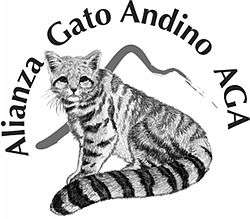Andean Cat Alliance
The Andean Cat Alliance (Alianza Gato Andino - AGA) is a network of researchers and conservationists working to study and protect the Andean cat (Leopardus jacobita) and its habitat in Argentina, Bolivia, Chile and Peru. It is partnered with the Wildlife Conservation Network,[1] and has developed a strategic plan for conservation of the species.[2][3]
 | |
| Founded | 2004 |
|---|---|
| Type | Non-profit Organization |
| Focus | Andean cat conservation |
Area served | Argentina, Bolivia, Chile and Peru |
Key people | Lilián Villalba (General Coordinator) |
| Website | gatoandino.org |
Organization
AGA was founded in 1999, and comprises around 25 professional biologists and other scientists.[4]
Andean cat
The Andean cat is regarded as one of the most endangered wild cats in the world and perhaps the rarest South American wild cat. Very little is known about this species and there have been only 10 documented sightings in the last 25 years.[5] The Alliance has managed to be the first to capture and radio-collar an Andean cat, and were also the first to obtain photographs by camera trap.[6]
Programs
Geographic distribution
The Andean Cat Alliance uses camera trapping, DNA analysis of feces, and surveys of local inhabitants to confirm the andean cats presence. AGA has widened the cat's known range in Peru and Argentina and has helped to better understand its population density and genetic variability.[4][7]
Education
The Andean Cat Alliance conducts training for park guards and local people to help them become local wildlife monitors so they may better contribute to protecting the andean cat and its habitat. Other activities include holding seminars and community festivals to both develop conservation strategies, and to raise awareness and learn the needs of the communities in each of the four range countries.[8] AGA's publicity initiatives have included getting the Chilean government to associate the animal with the "Day of Native Fauna", marked annually on 5 November.[4]
Conservation centers
The Alliance is building an EcoMuseo (“Ecological Museum”) in the “Centro Poblado Menor de Alto Perú,” a Peruvian village located in proximity to andean cat habitat.[8] Working with the Small Wild Cat Conservation Foundation (SWCCF) it has established a conservation center in the Salar de Surire, Chile, where it aims to dissuade the local people from hunting the animal.[9]
Increasing Protected Areas
One of the main goals of the Alliance is to work with governments to strengthen management of Andean cat habitat and promote new protected areas and corridors where needed.[8]
References
- "Andean Cat Alliance at Wildlife Conservation Network". WCN.
- Villalba, L.; Lucherini, M.; Walker, S.; Lagos, N.; Cossios, D.; Bennett, M. & Huaranca, J. (2016). "Leopardus jacobita". IUCN Red List of Threatened Species. 2016: e.T15452A50657407. doi:10.2305/IUCN.UK.2016-1.RLTS.T15452A50657407.en. Retrieved 13 January 2018.
- Fiona Sunquist; Mel Sunquist (2014). The Wild Cat Book: Everything You Ever Wanted to Know about Cats. University of Chicago Press. p. 123. ISBN 978-0-226-78026-9.
- Mongabay Latam; Miriam Telma Jemio (24 November 2016). "Cuatro países de Latinoamérica se unen para salvar al gato andino" [Four Latin American countries get together to save the Andean cat]. La Mula (Peru) (in Spanish).
- "Andean Cat Alliance (Alianza Gato Andino)". Elevated Destinations. Archived from the original on 2012-04-25.
- "Andean Cat". WCN.
- "Gotcha! Elusive and rare Andean mountain cats snapped in new location". Earth Touch News Network. 18 September 2015.
- "Allianza Gato Andina - AGA (english version)".
- Benedicto Cuervo Álvarez (17 July 2016). "El gato andino". Otro Mundo Es Posible (in Spanish).
External links
| Wikimedia Commons has media related to Leopardus jacobita. |
| Wikispecies has information related to Leopardus jacobita |